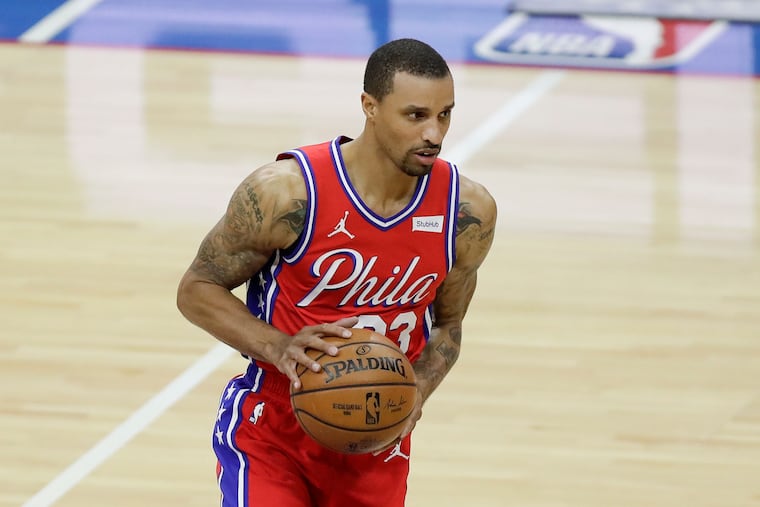As the anniversary of George Floyd’s murder passes, the Sixers’ George Hill wants Black Americans to uplift and respect each other
“You know the things that I want to see moving forward is us as Black men, us as kings and queens to start taking care of each other,” Hill said.

George Hill was at the forefront when the NBA, WNBA, Major League Baseball, and Major League Soccer seasons were interrupted on Aug. 26, 2020 to protest racial injustice and police brutality.
So the 76ers reserve point guard knew the magnitude of Tuesday, which marked the one-year anniversary of George Floyd’s murder. Floyd, an unarmed and handcuffed Black man, was killed last May 25 by since-fired Minneapolis police officer Derek Chauvin, who is white.
“I mean, it’s a day to remember,” Hill said after Tuesday’s practice. “You know the job is not done.”
As a Milwaukee Buck last Aug. 26, Hill spearheaded the Bucks’ boycott of Game 5 of their opening-round series against the Orlando Magic in protest of the shooting of Jacob Blake. Blake, a Black male, was shot by a white police officer in Kenosha, Wis.
“You know the things that I want to see moving forward is us as Black men, us as kings and queens, to start taking care of each other,” Hill said. “I know it’s easier said than done, and we get on other races for disrespect and things like that. But I think as a whole, we have to start respecting one another.”
» READ MORE: Doc Rivers’ message on anniversary of George Floyd’s murder: ‘Pass the George Floyd policing act bill’
He added that Black Americans have to stop killing one another first before being able to ask someone else to stop killing them.
“I think that’s the biggest thing that I would love to see moving forward is us just getting along as African Americans,” he said. “Men and women to uplift each other to support one another, because we are each other’s keeper and we are one child.”
The Sixers acquired the outspoken leader from the Oklahoma City Thunder in a three-team trade in March that included the New York Knicks. Hill, 35, has never had a problem using his platform to speak out on social injustice and speak up for the less fortunate.
“Most of those things hit home to me,” the Indianapolis native said. “I grew up in a rough neighborhood. I grew up in a family that’s been involved with the police plenty of times and things like that. So I’ve seen and it impacts me a certain way.”
While boycotting the playoff game, Hill and the Bucks called Wisconsin Lt. Gov. Mandela Barnes and Wisconsin Attorney General Josh Kaul to discuss measures to address criminal justice reform.
Back in his hometown, Hill has collaborated with community leaders to open HimByHer Collegiate School for the Arts. The school prepares underserved students for college entry and postgraduate success.
He also created a youth mentorship program in Milwaukee called George’s Gentlemen to help Milwaukee Public School students remain engaged during the pandemic. Hill played for the Bucks from 2018-20
Hill donated meals to health-care workers in San Antonio and contributed to the Bucks Emergency Relief Fund, which provided financial relief to employees of Fiserv Forum, the Bucks’ arena. Hill lives in San Antonio during the offseason and played for the Spurs the first three seasons of his career.
» READ MORE: Sixers’ Danny Green says anniversary of George Floyd’s murder is a reminder to refocus on making a change
Those are only a few of the many things Hill does.
Children in youth programs back in Indianapolis look up to him.
He’s also had many basketball-playing friends while growing up who are either in jail for murder or are dead.
“So it’s something that always has been instilled in me, the way my parents raised me, to speak up to be a leader not a follower,” Hill said. “But at the same time, I grew up the same way. I come from food stamps. I come from our lights getting turned off and sometimes we don’t have food to put on the table.
“Life is bigger than the sport that we play. In everyone’s eyes, we’re looked at as superheroes, but once we take these jerseys off and these capes off, and we’re brought into the community, we’re just another African American.”
Hill realizes that any one of the NBA players can get gunned down. That’s why life to him is bigger than basketball and speaking up has always been important to him.
“Like I said, I want us as Black African American men and women to start supporting one another,” he said. “Start uplifting each other and respecting one another, because I think once we respect each other and mean something to us, then others will follow suit.”